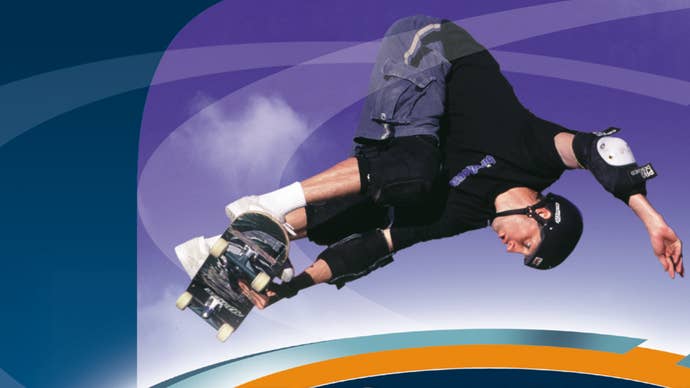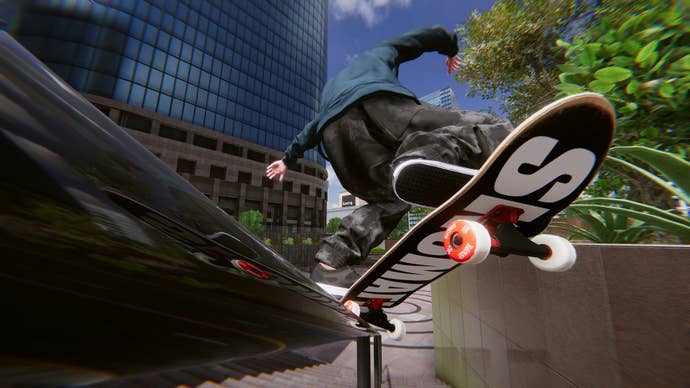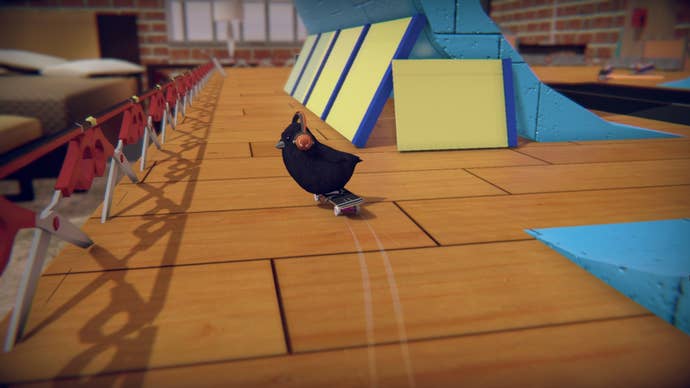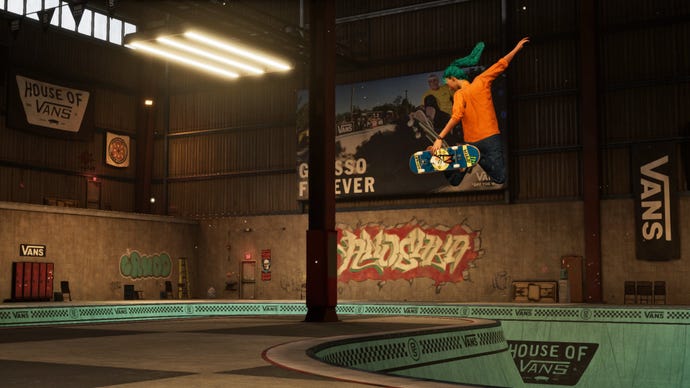Skate Culture's Revival Has Finally Hit Video Games
Pro skater Lizzie Armanto, the developers of Skater XL, and more reflect on the legacy and future of skateboarding games.
This article first appeared on USgamer, a partner publication of VG247. Some content, such as this article, has been migrated to VG247 for posterity after USgamer's closure - but it has not been edited or further vetted by the VG247 team.
As a child of the '90s, you either didn't play Tony Hawk's Pro Skater or you owned a skateboard; there was no in between. Now, in 2020, the THPS franchise is rebooting itself with a remake of the first two games, and it comes just as skate culture is having another moment in the spotlight.
Skating's influence goes further than just buying video games or trying out a board though. Skate punk was the definitive soundtrack of the early '00s; the grunge clothing of the '90s flowed easily into skate fashion, and the inherent nihilism of skateboarding's stunts helped pave the way for the success of TV shows like Jackass, which itself featured many professional skaters. In the late '90s and early '00s, everything was extreme, and skating was at the forefront of the zeitgeist.
However, by the late '00s, skate culture—as a staple of mainstream pop culture, if not as its own thriving subculture—was on its way out. Those '90s kids who bought skateboards had figured out it wasn't as simple as press X to ollie, and while we still bought the video games, they were no longer bringing in potential skaters.

Subsequent skating games never reached the cultural heights of the original THPS mania and eventually disappeared completely. However, along with the THPS reboot, EA have revived their Skate series, and a handful of indie skating games have either released earlier this year or are scheduled for next. It feels like the long drought is finally over.
These games come as skating culture is on the rise again. Young talented skaters like Leo Baker are appearing in Miley Cyrus videos, while Tyshawn Jones fronts GQ Style. Culture defining cities like London are seeing a boom in skating and skateparks, while skate fashion is back in trend. Where skate fashion once intertwined with the nihilism of early '00s punk, it now unites with mumblecore's convention defying focus of substance, blocky colors, and baggy comfort. We've even seen a Black Lives Matter protest entirely on skateboards in San Diego, combining the fiercely loyal ideals of skateboarding and grassroots protesting. Now, this cultural revival has finally hit video games. Several pros and developers spoke to us about how skating got here.
The View From A Board
Jenn Soto is a rapidly rising star in skating. Already in the top ten women street skaters for her age bracket, she would likely be even higher were it not for the fact she's missed the last few official contests. She's an avid gamer in her spare time, and she speaks to me about how closely linked the two cultures are. "There's a lot of passion in both," she laughs, "that's what kind of makes it go hand in hand. After a good skate sesh you get home and turn on the game system and get another session in. It's cool to see that you can have a dream to be a pro skate or pro gamer and it doesn't seem so far-fetched anymore."
Gaming and skating share more similarities than you might think. Both are traditionally male dominated but have grown away from that bubble in recent years, and both revolve around a few big money events each year peppered with lots of indie passion projects. Gaming and skating both typically contain a mix of blockbuster moments built on technical ability, too. According to Soto, the games were a crucial part of the '00s scene, introducing many current pros to the joys of skating. "I feel like most skaters have definitely played the Tony Hawk's Pro Skater series," Soto says. "I used to play that game before I even had a skateboard. It was one of those games you'd run to after getting out of school."
The original video games introduced a wider range of people to the sport than might have otherwise picked it up. As Lizzie Armanto explains, this has led to a much more diverse crop of skaters 20 years on.
Armanto is currently ranked 9th in the world overall (1st for women) and has been skating since she was 14. In her 13 years on the scene, she's been there for the slump and subsequent revival. According to Armanto, the most substantial change in that time has been the rise in diversity.
"The biggest change I've seen is the number of girls getting into and competing in skateboarding now. Ten years ago, there would be two girls at a park and now, it's common to see groups of girls at a park." Programs like Skate Like A Girl have been set up to help further this diversity, and this change is mirrored in the newer skating games too. The original Tony Hawk's Pro Skater only had one non-male and two non-white skaters: Elissa Steamer, Kareem Campbell, and Eric Koston respectively. Tony Hawk's Pro Skater 5, released in 2015, is where Armanto first appeared. It also featured the skaters Leticia Bufoni, Nyjah Huston, and Ishod Wair. The remake sees the original cast joined by Armanto, Bufoni, and Huston along with Aori Nishimura, Tyshawn Jones, and Leo Baker, with the latter being the first non-binary skater to feature in the series.
Armanto adds that she's pleased to see this growing diversity reflected in the game, and that as skating continues along its current rise, it can welcome even more people in. "There's much more diversity today than ten years ago and hopefully will be even more ten years from now," says Armanto. "It's really cool that so many different types of pro skaters are represented in the game."
Soto has seen a similar shift in her time on the board. "Diversity in skateboarding has definitely been on the come up right now," she says. "So many people are getting the opportunities that they deserve and are long overdue. It's tight to be a part of."
Redefining The Genre
While THPS 1+2 Remake and Skate 4 are the headliners of skate gaming's revival, in recent years there has been a plethora of skating games which showcase that this is not a simple legends reunion tour, but a full-blooded comeback. Session and Skater XL both pick up where Skate 3 left off, exploring the art of skating at a much more technical level, and Skater XL's development team explains how that meant taking a new approach from the ground up.
In Skater XL, each stick controls a foot, designed to give you more complete control around the tricks you pull off. No two kickflips are the same in real life, and while other skating games rely on pre-programmed tricks, making every instance identical, Skater XL's unique design means each trick is a snowflake. The developers at Easy Day Studios talk about the importance of this idea, and how it "reflects and parallels real skateboarding." This was especially key when it came to reflecting modern skate culture, as the scene is all about "a lifestyle of culture [with] a real expressive element."
While the original big skating games were very much about introducing players to the energy, moves, and big tricks of the sport, Skater XL strives to bring the culture to life, taking cues from golden era skate videos, modern era skating ingenuity, and the classic video games in equal measure. In doing so, the game has captured the hearts of skaters and has created a huge 100,000 strong Discord community of modders who create maps of their own dream spots. A map featuring Barcelona even made it into the console edition of the game that released in late July.

Meanwhile, Skater XL's core maps include a redesigned version of Downtown Los Angeles, one which has been redrawn as a skater's paradise. In it, all of LA's best spots have been crammed together in a "high density reimagining of LA," including trick spots which have since been demolished, redesigned, or closed off. Other famous LA spots have been moved together, to create a skater's fever dream of endless Los Angeles lines. While the feeling throughout the general game design was "how do we capture what's fun about skateboarding?", the goal with LA specifically according to the developers was to "create a city to skate in that our audience either don't have access to, or don't have the skill level for."
Skater XL definitely has the thrill of skateboarding at its core, but it's a very realistic, technically based thrill. Other indie games are taking the concept of skateboarding and using that to power much more imaginative gameplay. Tanuki Sunset and Skate Story both take the unique velocity of downhill skateboarding, wrap it up in futuristic visuals, and use it to create a linear experience. Even more interesting is the upcoming Skatebird, which is all about skateboarding birds. You might say that in skateboarding terms, Skater XL skates regular, while Skatebird has gone goofy.
And yes, they do have a hawk called Tony.
Megan Fox, Skatebird's lead developer, has a theory on why more experimental indie games are coming to the forefront of the skating genre right now. "It's a mixture of nostalgia waves and how indie-accessible genres trail triple-A. Triple-A studios tend to abandon genres when they've scaled up to where they can't keep making even bigger sequels that make more money, because the audience is maxed out," Fox says, "those genres then sit abandoned until smaller studios, with newer tools and better engines and all that, can then afford to make games that at least somewhat compare to those now-ancient triple-A games people remember."
Fox says Skatebird takes inspiration from both Skate and THPS, avoiding the "hardcore, arcade physics" of THPS, while keeping Skate's realistic movements, though in a much less technical way. "Skatebird skews more casual-friendly," Fox says. "Especially looking back at THPS games through the lens of current gaming, they were incredibly unforgiving, and just not very friendly to new players."
When speaking about the importance of grassroots skating games, the Skater XL development team talks about the dry spell skating games suffered through recently, and the real need for a resurgence as the skating community was becoming galvanised again. "Imagine if FIFA wasn't there," they say.

If we assume we can also take PES out of this imagining, it paints a rather stark picture. Sports games have always been a core genre of gaming, and to not have your sport represented in the virtual world is a damning indictment of its lack of mainstream popularity. As the tides of culture ebb and flow, skating is on the rise again. It's carried skateboarding back to the big time, as evidenced by the sport debuting at the the Summer Olympic Games next year.
Armanto is one of the skaters competing in the first Olympic skating events, representing Finland. "It's crazy to be going to the Olympics for skateboarding. I never thought going to the Olympics would be in the cards for me," Armanto says. "Skateboarding being recognized by the Olympics is rad because with its addition comes more opportunities such as more events, room for people to pursue skateboarding, and new skateparks being built. Also more people will see skateboarding as more than just a hobby or toy." Armanto could have competed for either for Finland or the USA, but elected to go for Finland to leave room for more high-level American skaters to qualify, ensuring skating can show off the best in the business on the world stage. Soto, meanwhile, will represent the USA.
Recognition by the highest sporting body in the world highlights not only skating's new rise to prominence, but also its subtle rebranding since its last peak in the early '00s. Back then, when skating was buddies with Jackass, it was surrounded by a very dudebro mentality, and felt like it belonged to a very specific type of young man. Now, it's more welcoming, less rough around the edges, and feels more like a sport which features extreme moments, rather than an extreme sport with all the associations that brings. The THPS 1+2 Remake has even renamed the Mute grab as the Weedle grab to better pay tribute to the move's creator Chris Weedle, who was in fact deaf, not mute. This kind of sensitivity might have been mocked in the '90s and '00s, but it's now being praised for recognizing the original ableist tones.
With video games set to push skating further into the limelight, it will no doubt continue to evolve in new ways as a young, fresh audience gets their first taste of the sport in 2020, in much the same way '90s kids did back in 1999. That could see it continue to influence and be influenced by pop culture, with skating's new, diverse attitude being perfect for the modern era. If the big skating franchises want to hit the heights they did back in their heyday though, they need to be willing to move with the times.
While Armanto identifies the Olympics as a big step in skating's continued cultural revival, Soto thinks the real fruits of this revolution will be found on the streets. "It's cool to see more and more skaters cruising down the street. I have no doubt that it'll just keep growing and the opportunities from that will soon follow. Skaters are stylish and dope, so it'll be just fine!"


